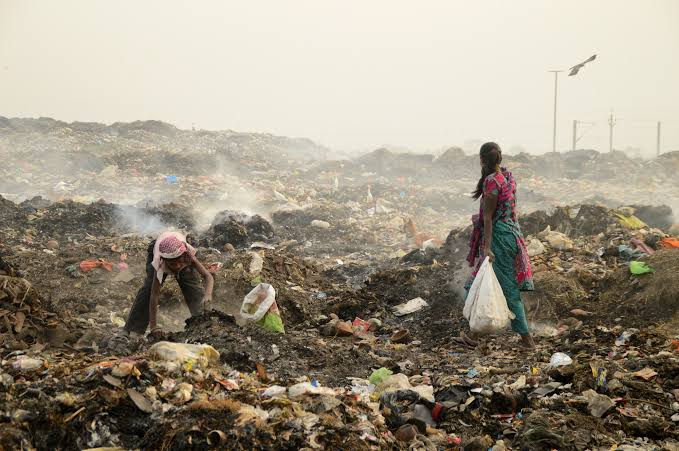Kachara Pickers: The Hands That Carry the City's Garbage
- NewsDirt

- Feb 14, 2025
- 3 min read

In the quiet hours of the morning, as most of Nagpur wakes up to the promise of a new day, an army of unseen workers begins their routine.
The streets, still damp from the early dew, bear witness to the silent march of individuals whose job is as essential as it is overlooked. Kachara Pickers arrive before the city stirs, moving swiftly through narrow lanes and busy roads alike, collecting what the rest of the population has discarded.
For many, the sight of waste is unpleasant, something to be quickly disposed of and forgotten. Yet, for those who collect it, this discarded refuse is their daily reality.
Bags filled with leftover food, plastic wrappers, broken glass, and used hygiene products are gathered with bare hands, examined briefly, and sorted in the hope of salvaging something valuable. Their day begins with the scent of decay and the weight of society’s waste, but there is no time for hesitation. The work must continue.
A Routine Marked by Challenges
Nagpur generates an estimated 1,450 metric tonnes of waste daily, a figure that has surged in recent years. This vast amount of refuse is moved across the city by those whose presence often goes unnoticed.
Their tasks remain the same regardless of the weather scorching summers, unpredictable monsoons, and harsh winters do not change the nature of their work.
While many assume that waste collectors are equipped with the necessary gear to handle hazardous materials, the reality is far from it. Protective gloves, masks, and uniforms are scarce, leaving them exposed to sharp objects, toxic fumes, and bacterial infections.
With each bag they sift through, Kachara Pickers risk injury and illness. Despite these dangers, the work continues, driven by the necessity of earning a livelihood.
Beyond physical risks, waste collectors also face social stigma. Their work, though vital, is often looked down upon.
Many are treated as invisible, their presence acknowledged only when a bin needs to be emptied.
Conversations, if they happen at all, are brief and transactional. There is no appreciation, no recognition, only the expectation that they will return the next day to carry away the waste of another cycle.
Sorting Through the City's Refuse
The process of handling waste is more complex than it appears. Segregation is crucial, yet often neglected.
Despite repeated awareness campaigns, a large portion of Nagpur’s waste remains mixed, food scraps blend with plastics, glass shards hide beneath paper, and medical waste finds its way into ordinary trash.
For the Kachara Pickers, this makes their job even harder. Instead of efficiently sorting at the source, they must separate materials by hand, increasing the time and effort required.
According to Nagpur’s District Environment Plan, the city has 263 plastic waste pickers working across 24 collection centres.
Their role extends beyond simple collection; they contribute to the recycling process, ensuring that plastics, metals, and other reusable materials do not end up in landfills. Yet, despite their contribution, they receive minimal compensation, with earnings largely dependent on the fluctuating value of recyclables.
Beyond the plastic waste sector, there are thousands more engaged in general waste collection, moving refuse from residential areas to dumping sites.
The work is physically demanding, requiring long hours of walking, lifting, and sorting. Their only respite comes in the form of brief pauses between collection rounds, before they must resume the cycle once more.
The Unrecognised Workforce
Waste collection is a necessity, yet those who perform it remain in the shadows. Their hands remove filth from the streets, yet they are seldom acknowledged. The phrase “Gaadi wala aaya ghar se kachra nikaal” is familiar across households, a daily cue to take out the rubbish. Yet, few stop to think about the lives behind this melody.
For many Kachara Pickers, this work is generational. Parents introduce their children to the trade, not out of choice, but due to lack of alternatives.
Formal education is rare, and opportunities outside the waste sector are limited. The cycle continues, with new generations stepping into the same role, carrying the weight of the city’s refuse as those before them did.
The involvement of organisations like the Centre for Sustainable Development (CFSD) has brought some relief, facilitating the distribution of identification cards and organising health check-ups.
However, these efforts only scratch the surface of a much deeper issue.
As the day draws to a close, the waste bins fill up once more.
The cycle is endless, a routine that never truly stops. While the rest of the city prepares for another morning, the waste collectors remain in the background, ready to repeat the process, unseen but essential.
References
Centre for Sustainable Development (CFSD). (n.d.). Retrieved from https://globalrec.org/organization/centre-for-sustainable-development-cfsd/
District Environment Plan: Nagpur. (n.d.). Retrieved from https://mpcb.gov.in/sites/default/files/environmentactionplan/Nagpur23062021.pdf
Nagpur grapples with rising garbage generation amid cleanliness challenges. (2025, January 21). Nagpur Today. Retrieved from https://www.nagpurtoday.in/nagpur-grapples-with-rising-garbage-generation-amid-cleanliness-challenges/01211718



Comments